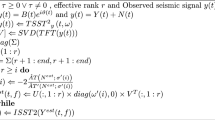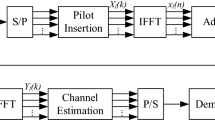Abstract
In orthogonal frequency-division multiplexing systems, the temporal channel gains to estimate are much more than the observable data over highly mobile channels. The basis expansion model (BEM) has been employed to reduce the number of these channel parameters. In the absence of channel statistics, generalized complex-exponential BEM (GCE-BEM) is popular for its fast algebra operation and easy generation of basis matrix. However, there is still much potential for performance improvement by modeling error reduction. In this paper, the factors affecting the modeling error are analyzed and an iterative decomposed estimation algorithm is proposed to improve the modeling accuracy. The proposed algorithm decomposes each tap into the linear part and the non-linear part. The linear part with two parameters (the middle value and the slope) is initialized by estimation in linearly time-varying channel models. And the non-linear part is addressed by the conventional least-squares (LS) method based on GCE-BEM and then the slopes of the linear part are updated for the next iteration by two distinct slope update methods. The simulations show that the proposed algorithm outperforms the conventional estimation methods with significantly reduced modeling error under both high signal to noise ratio and Doppler shift conditions.
Similar content being viewed by others
References
Wang Z., Giannakis G. B. (2000) Wireless multicarrier communications. IEEE Signal Processing Magazine 17(Compendex): 29–48
Mostofi Y., Cox D. C. (2005) ICI mitigation for pilot-aided OFDM mobile systems. IEEE Transactions on Wireless Communications 4(Compendex): 765–774
Hijazi H., Ros L. (2009) Polynomial estimation of time-varying multipath gains with intercarrier interference mitigation in OFDM systems. IEEE Transactions on Vehicular Technology 58(1): 140–151
Hijazi H., Ros L. (2009) Rayleigh time-varying channel complex gains estimation and ICI cancellation in OFDM systems. European Transactions on Telecommunications 20(8): 782–796. doi:10.1002/ett.1366
Hijazi H., Ros L. (2010) Joint data QR-detection and Kalman estimation for OFDM time-varying Rayleigh channel complex gains. IEEE Transactions on Communications 58(1): 170–178
Kyungchul K., Sungeun L., Hyunkee M., Sooyong C., Daesik H. (2010) New OFDM channel estimation with dual-ICI cancellation in highly mobile channel. IEEE Transactions on Wireless Communications 9(10): 3155–3165
Senol H., Cirpan H. A., Panayirci E. (2005) A low-complexity KL expansion-based channel estimator for OFDM systems. EURASIP Journal on Wireless Communications Network 2005(2): 12
Zemen T., Mecklenbrauker C. F. (2005) Time-variant channel estimation using discrete prolate spheroidal sequences. IEEE Transactions on Signal Processing 53(9): 3597–3607
Jakobsen, M. L., Laugesen, K., Manchon, C. N., Kirkelund, G. E., Rom, C., & Fleury, B. (2010). Parametric modeling and pilot-aided estimation of the wireless multipath channel in OFDM systems. In 2010 IEEE international conference on communications, May 23 2010–May 27 2010, Cape Town, South africa.
Yang, W.-B., & Yang, T. C. (2006). Characterization and modeling of underwater acoustic communications channels for frequency-shift-keying signals. In OCEANS 2006, September 18, 2006–September 21, 2006, Boston, MA, United states. doi:10.1109/oceans.2006.306981.
Wang X., Liu K. J. R. (2002) Channel estimation for multicarrier modulation systems using a time-frequency polynomial model. IEEE Transactions on Communications 50(7): 1045–1048
Borah D. K., Hart B. T. (1999) Frequency-selective fading channel estimation with a polynomial time-varying channel model. IEEE Transactions on Communications 47(6): 862–873
Giannakis G. B., Tepedelenlioglu C. (1998) Basis expansion models and diversity techniques for blind identification and equalization of time-varying channels. Proceedings of the IEEE 86(10): 1969–1986
Leus, G. (2004). On the estimation of rapidly time-varying channels. In European Signal Processing Conference (EUSIPCO) (pp. 2227–2230).
Qu F., Yang L. (2010) On the estimation of doubly-selective fading channels. IEEE Transactions on Wireless Communications 9(Compendex): 1261–1265
Idrees, N. M., Haselmayr, W., Schellander, D., & Springer, A. (2010). Time variant channel estimation using a modified complex exponential basis expansion model in LTE-OFDM systems. In 2010 IEEE 21st international symposium on personal indoor and mobile radio communications, PIMRC 2010, September 26, 2010–September 30, 2010 (pp. 603–607). Istanbul, Turkey.
Kay S. M. (1993) Fundamentals of statistical signal processing, volume I: Estimation theory (v. 1). Prentice-Hall, NJ, USA
Bello P. (1963) Characterization of randomly time-variant linear channels. IEEE Transactions on Communications Systems 11(4): 360–393
Jakes, W., & Cox, D. (1994). Microwave mobile communications. New York: Wiley-IEEE Press.
Tang Z., Cannizzaro R. C., Leus G., Banelli P. (2007) Pilot-assisted time-varying channel estimation for OFDM systems. IEEE Transactions on Signal Processing 55(Compendex): 2226–2238
Ma X., Giannakis G. B., Ohno S. (2003) Optimal training for block transmissions over doubly selective wireless fading channels. IEEE Transactions on Signal Processing 51(Compendex): 1351–1366
van de Beek, J.-J., Edfors, O., Sandell, M., Wilson, S. K., & Borjesson, P. O. (1995). On channel estimation in OFDM systems. In Proceedings of the 1995 IEEE 45th vehicular technology conference. Part 2 (of 2), July 25, 1995–July 28, 1995 (Vol. 2, pp. 815–819). Chicago, IL, USA.
Edfors O., Sandell M., van de Beek J.-J., Wilson S. K., Borjesson P. O. (1998) OFDM channel estimation by singular value decomposition. IEEE Transactions on Communications 46(Compendex): 931–939
Failli, M. (1989). Digital land radio communications COST 207, technology report, European commission.
Kannu, A. R., & Schniter, P. MSE-optimal training for linear time-varying channels. In Acoustics, speech, and signal processing, 2005. Proceedings (Vol. 3, pp. iii/789–iii/792 Vol. 783).
Author information
Authors and Affiliations
Corresponding author
Rights and permissions
About this article
Cite this article
Guo, Q., Wu, M., Zhang, Q. et al. Iterative Decomposed OFDM Channel Estimation Algorithm Over Highly Mobile Channels. Wireless Pers Commun 71, 1137–1158 (2013). https://doi.org/10.1007/s11277-012-0866-1
Published:
Issue Date:
DOI: https://doi.org/10.1007/s11277-012-0866-1




